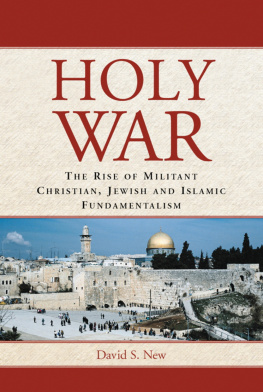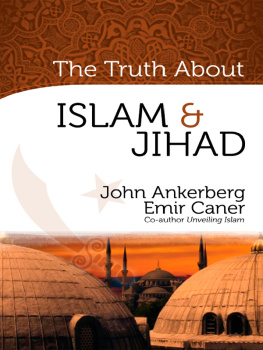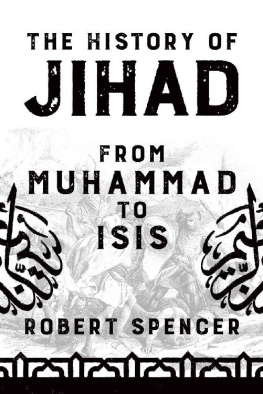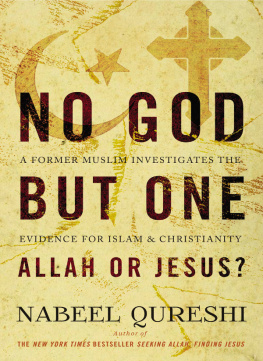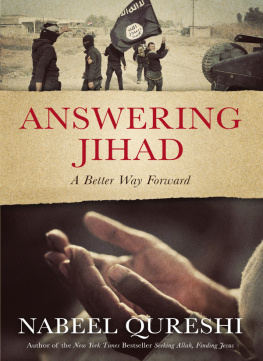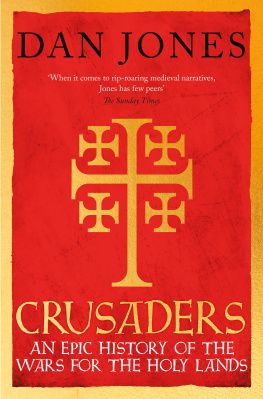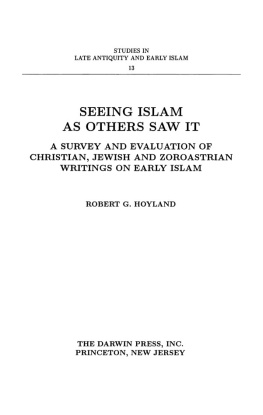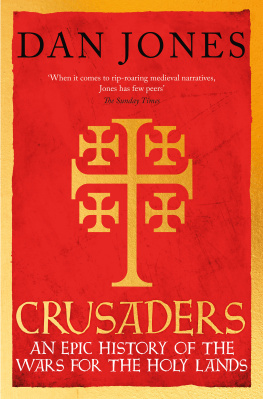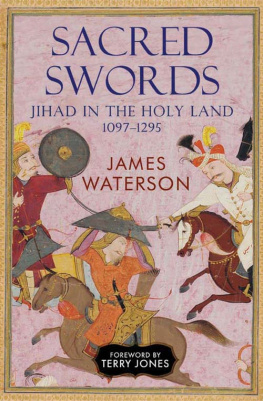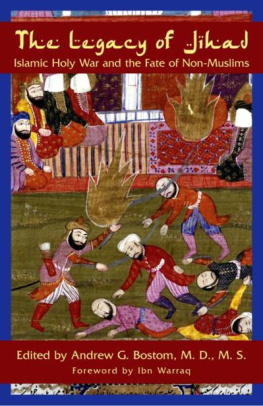Just Wars, Holy Wars, and Jihads
Just Wars, Holy Wars, and Jihads
Christian, Jewish, and Muslim Encounters and Exchanges
EDITED BY SOHAIL H. HASHMI


Oxford University Press, Inc., publishes works that further
Oxford Universitys objective of excellence
in research, scholarship, and education by publishing worldwide.
Oxford New York
Auckland Cape Town Dar es Salaam Hong Kong Karachi
Kuala Lumpur Madrid Melbourne Mexico City Nairobi
New Delhi Shanghai Taipei Toronto
With offices in
Argentina Austria Brazil Chile Czech Republic France
Greece Guatemala Hungary Italy Japan Poland Portugal Singapore
South Korea Switzerland Thailand Turkey Ukraine Vietnam
Copyright 2012 by Oxford University Press
Published in the United States of America by Oxford University Press
198 Madison Avenue, New York, New York 10016
Oxford is a registered trademark of Oxford University Press in the UK and certain other countries.
All rights reserved. No part of this publication may be reproduced,
stored in a retrieval system, or transmitted, in any form or by any means,
without the prior permission in writing of Oxford University Press, or as expressly permitted by law,
by license, or under terms agreed with the appropriate reproduction rights organization.
Inquiries concerning reproduction outside the scope of the above should be sent to the Rights Department,
Oxford University Press, at the address above.
You must not circulate this work in any other form
and you must impose this same condition on any acquirer.
Library of Congress Cataloging-in-Publication Data
Just wars, holy wars, and jihads: Christian, Jewish, and Muslim encounters
and exchanges / edited by Sohail H. Hashmi.
p. cm.
Includes index.
ISBN 978-0-19-975503-5 (paperback) ISBN 978-0-19-975504-2 (hardcover) 1. WarReligious aspects.
2. Just war doctrine. 3. Jihad. 4. WarReligious aspectsChristianity. 5. WarReligious aspectsJudaism.
6. WarReligious aspectsIslam. I. Hashmi, Sohail H., 1962
BL65.W2J87 2012
201.7273dc23 2012003852
1 3 5 7 9 8 6 4 2
Printed in the United States of America
on acid-free paper
To the memory of
Omar Khalidi
(19532010)
CONTENTS
SOHAIL H. HASHMI AND JAMES TURNER JOHNSON
PAUL STEPHENSON
ASMA AFSARUDDIN
MICHAEL PHILIP PENN
JOSHUA C. BIRK
SULEIMAN A. MOURAD AND JAMES E. LINDSAY
G. SCOTT DAVIS
GEORGE R. WILKES
BRINDA CHARRY
A. NURI YURDUSEV
JOHN KELSAY
BENJAMIN CLAUDE BROWER
DAVID ROBINSON
HEATHER J. SHARKEY
MUSTAFA AKSAKAL
OMAR KHALIDI
SOHAIL H. HASHMI
SUZANNE LAST STONE
DAVID COOK
MARTIN L. COOK
JAMES TURNER JOHNSON
ACKNOWLEDGMENTS
This book began to develop many years ago when John Kelsay invited Martin Cook, James Turner Johnson, and me to join him in a study group on just war and jihad. I thank Jim, John, and Martin for their encouragement of this project from the start and their many valuable suggestions for how to improve this book.
The chapters in this volume benefited greatly from discussions at a colloquium held at Mount Holyoke College in October 2008. Financial support for this event came from the following sources at Mount Holyoke: the Purrington Fund and the Office of the Dean of the College, the Office of the Dean of Faculty, the McCulloch Center for Global Initiatives, and the Weissman Center for Leadership. Special thanks are due to Lee Bowie, Lois Brown, Penny Gill, Donal OShea, and Eva Paus. The following scholars generously offered their time and insights at the colloquium: Kavita Datla, Harold Garrett-Goodyear, John Grayson, Holly Hanson, Iza Hussin, David Perry, and Nadya Sbaiti. Administrative support was graciously provided by James Burke, Linda Fernandes, Bryan Goodwin, Anne-Laure Malauzat, and Marian Smith.
The production of this book was facilitated by the able editorial assistance of Andrea Reynolds. An anonymous reviewer for Oxford University Press offered many helpful suggestions, both substantive and stylistic. Doreen St. John produced the maps that accompany . Finally, thanks to Theo Calderara, our editor at Oxford University Press, for his unflagging and patient support of this work.
This book is dedicated to the memory of our friend and colleague Omar Khalidi, who died just days after completing work on his chapter in this volume. Omar was a thoughtful mentor, a prolific writer, and a provocative public intellectual, tireless in his lobbying for justice for all of Indias citizens. His untimely death stilled a restless mind and a generous heart.
SHH
South Hadley, Mass.
CONTRIBUTORS
Asma Afsaruddin is Professor of Near Eastern Languages and Cultures at Indiana University. She is the author or editor of four books, including The First Muslims: History and Memory and Excellence and Precedence: Medieval Islamic Discourse on Legitimate Leadership. She is currently completing a manuscript on a historical survey of jihad and martyrdom in Islamic thought and praxis.
Mustafa Aksakal is Associate Professor of Modern Turkish Studies and History at Georgetown University. His research interests focus on the political history of the modern Middle East and the regions role in international politics. He is the author of The Ottoman Road to War in 1914: The Ottoman Empire and the First World War.
Joshua C. Birk is Assistant Professor of History at Smith College, specializing in political history and identity politics across religious boundaries in the medieval Mediterranean world. He is currently writing a book titled Baptized Sultans: The Norman Rulers of Sicily and Their Muslim Subjects, which examines how the Christian rulers of Sicily co-opted and redeployed Islamic cultural tropes and administrative techniques to project their authority over Sicily in the eleventh and twelfth centuries.
Benjamin Claude Brower is Assistant Professor in the Department of History at the University of Texas at Austin. His research focuses on French colonialism and its impact on Algerian society. He is the author of A Desert Named Peace: The Violence of Frances Empire in the Algerian Sahara, 18441902, a study of colonial violence in nineteenth-century Algeria. He is currently at work on a history of Muslim pilgrimage to Mecca and the Holy Places made from Frances Mediterranean colonies, a project titled The Mediterranean Hajj under French Rule, 17981962.
Brinda Charry teaches early modern English literature and culture at Keene State College. Her area of specialization is early modern globalism and cross-cultural encounter, with a special emphasis on Anglo-Ottoman engagement as manifested in literary and cultural documents. She is the coeditor of Mediating Worlds: Early Modern Emissaries, 15001700 and author of three works of fiction: The Hottest Day of the Year, Naked in the Wind, and First Love and Other Stories.
David Cook is Associate Professor in the Department of Religious Studies at Rice University. His interests include the study of early Islam, Muslim apocalyptic literature and movements for radical social change, dreams, historical astronomy, Judeo-Arabic literature, and West African Islam. His books include
Next page

